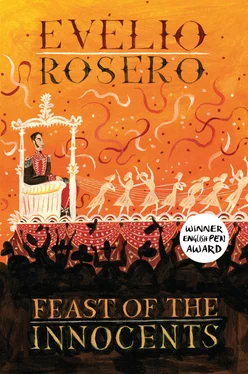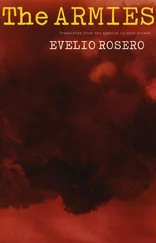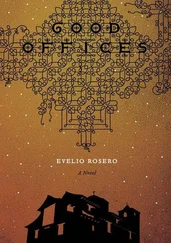“True, why screw Bolívar?” the professor agreed, to ingratiate himself with the bishop.
“‘Screw,’ what an ugly word,” the bishop said, put out. He wanted to go on talking, but just the sight of the professor’s smile dissuaded him.
“No-one here is trying to screw anyone,” the doctor countered. “And what vile injustice towards Sañudo: I still see his ghost passing along Pasto’s streets, always alone, and why wouldn’t he be? In 1925 he dared do no less than the worst thing you can do in this country: tell the truth. It’s the memory of the truth, which struggles to prevail sooner or later. By correcting the error of the past, speaking out against it, you correct the absence of memory, which is one of the main causes of our social and political present, founded on lies and murder. It’s not a whim, Arcaín; it’s our duty to dot the i’s if we don’t want to sin by omission. I’m surprised at you, we’ve talked about this. You share my views more than anyone.”
“Of course,” the professor replied, offended. “And what’s more I speak from personal experience. Remember what happened to me at the university. I’ll remind you if you ask — may I remind you all?”
“While we’re on the subject of truth,” Matías Serrano said, scorning the professor’s own experiences, “I want to let you in on something I’m convinced of, after carrying it around with me for years: Simón Bolívar, the long-winded author of proclamations and ravings, could not have written the Jamaica Letter, the famous one.”
“And if Bolívar didn’t write it, who did?” Primavera asked, just for the sake of it.
All eyes turned towards her. Primavera was entranced by herself; she found she liked the sound of her own voice. She recalled that famous letter, read and reread to the point of tedium at school: Franciscan Sisters, Father Muñoz, history class.
“Some wise little fellow,” the professor said, happy to be exchanging views once more with the only woman at the gathering. “A disinterested foreigner?” he wondered. “An idealistic friend of Bolívar’s? It’s possible; in any case, the Jamaica Letter is nothing out of this world, for goodness’ sake. But I agree: nobody knows who wrote it.”
“Some little ‘philanthropist’ of the day?” Primavera responded.
Chivo hung onto her words, like one begging for mercy.
“Bolívar did not want for power or gold,” the mayor said, “to procure good services. He had no end of amanuenses, ranging from the most well-informed to the most uncouth. The truth is, it’s hard to believe in his authorship; the Jamaica Letter is no big deal, true, but it’s a sensible analysis, and it’s not in Bolívar’s style, if we think of his other writings, those from before and after that ‘Delirium on Chimborazo,’ including the ‘Cartagena Manifesto,’ the ‘Angostura Address’ and the ‘Message to the Congress of Bolivia.’”
That “Delirium” was another of Bolívar’s writings, Primavera remembered, almost a poem, that she and two fellow students recited as girls, one July 20, day of the Cry of Independence: “ I came, wrapped in the mantle of Iris… A feverish delirium seized my mind. I felt inflamed by a strange superior fire. It was the God of Colombia who possessed me… ”
“And even if he did write the Jamaica Letter?” Doctor Proceso said. “What is written with the hand is wiped out with the feet. How about him talking of freedoms while planning to crown himself monarch of the Andes? He urged on the advances of the republic, but behind the scenes tore down everything he constructed in public; he schemed, deceived, dissembled, so that once again those around him echoed his real objective: dictatorship, which they proposed as if it would never have occurred to him. There were innumerable occasions. He was engaged only in this, while the crucial priorities of the new republic were held in abeyance: education, industry, those things that make for the real independence of a country — not the independence of one master being replaced by another. Oh, the soldier: he prolonged the war to suit himself. For years. Chaos fascinated him. The most naive now say that he aspired to monarchy because he found it necessary in order to combat the fickleness and brutalities of the politicians of his day; nothing could be further from the truth: he led the way in fickle brutality, he was the prototype himself. If there was killing to be done on a whim, he killed on a whim. The dream of Gran Colombia was his own dream, of his own power. He delegated authority and public wealth to rough squaddies and unrefined thinkers, to the toadies who did not trouble his ambition, the same men who ruined Colombia at his fall, imitating him like little mirrors from which destiny called them. Upon the living flesh of Gran Colombia (a beautiful dream if you look at it like a child, but a dream for us, the millions of us, not for Bolívar), upon Gran Colombia’s young body, his minions carved out larcenies of their own: if he did it, so can I. All those treacherous men are epitomized, explicitly, by one of the most unpleasant sycophants: Vidaurre, a character from Peru, Bolívar’s plenipotentiary for the Panama congress, who got down on all fours in meetings so that Bolívar might mount him: and Bolívar did; Bolívar provided the disastrous model that would turn itself over time into Colombia’s political culture.”
All the while, Doctor Proceso was rifling about in the cabinet drawers. What was he looking for? A book, a letter, a document? He could not find what he was after and this fact seemed to weigh down not just upon him, but on his audience too.
“Well, señores ,” he said, “I have human records, which might clarify certain hidden aspects of Bolívar, those aspects repudiated by historians. To be precise I’ve called them ‘Human Investigations.’ I’d like to share two of the most important testimonies with you: two tapes, two recordings.”
And from a drawer he took a white tape recorder, and placed it beside the trays, which encouraged the guests to eat empanadas and drink more aguardiente.
“Belencito Jojoa, Polina Agrado,” the doctor said. “Do those names mean anything to you?”
“I knew Polina Agrado, may she rest in peace,” the Bishop of Pasto said. “An upright woman. God bless her soul.”
“And we’re all familiar with Belencito Jojoa, of course,” Chivo, the professor, added. “They say he’s very sick.”
“Two of Pasto’s old folk,” Matías Serrano sighed heavily. “How could we forget them? And we know their stories, too.”
“But not in their own words,” the doctor replied.
He carried on opening and closing drawers, showing his irritation for the first time. He did not find what he was looking for. Finally he opened and searched the last drawer, which he thought would be the end of it, but still he found nothing. His voice trembled: was he muttering? Talking to himself? He looked anew in the drawers he had already been through: it seemed he had found the recorder, but not the tapes.
“Which of the two tapes shall we start with?” the mayor asked. “Doña Polina or Belencito?”
“Justo Pastor has to find them first,” the professor replied, unruffled. “Couldn’t we run through my own Bolivarian experience at the university in the meantime?”
“Patience, Justo Pastor,” the bishop said, paying no heed to the professor’s request. “You could have put the tapes in another cupboard.”
“When the tapes appear, we’ll start with whichever one you choose, señora ,” the professor said. “Polina or Belencito?”
He awaited the answer eagerly: unable to prise his eyes from Primavera, as she lounged beside the bishop, legs crossed; one of her sandals, half falling off, showed her delicate toes, tiny and pink; above, her pearly face was hidden behind the smoke from a cigarette.
Читать дальше












